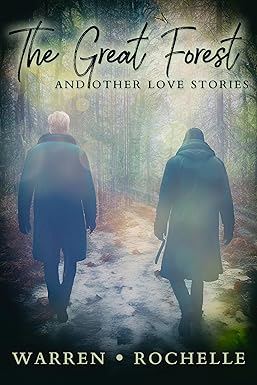 The Great Forest and Other Love Stories
The Great Forest and Other Love Stories MM sci-fi/fantasy/paranormal romance
JMS Books
11/16/24
Kindle
251
Amazon

Amazon Link: amazon
We all want to be loved, and to love. But finding true and lasting love is not always easy, and sometimes comes at a cost. Sometimes, love hurts. Sometimes, the obstacles separating us from true love may seem insurmountable. In this collection by best-selling gay fantasy author Warren Rochelle, love is found next door as well as twelve lightyears away.
In the title story, Edvard is the accident, the unplanned child. His mother is the Ambassador of the Human Community to the Great Forest on the planet Wertynger, a forest of sentient trees. His father is the Embassy’s chief legal counsel. His golden brothers are on other worlds in the Human Community, bound for success. Not Edvard, to the despair of his parents. When he meets Luc, who loves Ed for who he is, everything changes. His parents separate them, sending Edvard to school lightyears away on Earth. Ed promises to come back and marry Luc. When Luc is taken by the minions of the Holy Trees, their love is sorely tested. Happily ever after is no longer certain. It may even be impossible.
Throughout other stories, love is tested in many ways. Can a man trust a mysterious voice on the radio, calling for him? What if your lover asks you to make a curse? Or if your husband is hearing voices in his dreams, voices somehow connected to a comet? Can promises made in one universe be kept in another? Will these lovers have a happily ever after, or at least, for now?
Review By ReviewerName
Member of the Paranormal Romance Guild Review Team
Amazon Link: amazon
I felt very targeted by this book—and that’s not a complaint. Anthologies are, for me, difficult to review, because they have multiple parts which can’t be simply included in some sort of blanket opinion. As the title suggests, every part of this collection is about love, but that suggests a sameness that fails to represent the literary variety and emotional range these works offer. It’s important to understand that love stories don’t always have happy endings. That’s one reason I found myself in tears more than once.
Rochelle is very good with characters, and each of the people who populate these works felt fully rounded and unique as I imagined them in the reading.
Drinking the Moon is a beautiful word-picture about creation—or maybe self-creation. Inspired by a line from a poem by Sufi mystic Rumi, it is deceptively simple—and all the more moving for that. I think it sets the tone for the entire book.
The Great Forest is the title piece and also the longest story here. It is really a sort of sci-fi/magical fantasy that takes place in what I call a “happy post-apocalyptic” world. It is an adventure and a love story, and fooled me into thinking all the stories in the book would end this way. Two boys of very different backgrounds meet in school, and it’s a meeting that will change both of their lives.
On the Radio is a short fantasy piece that felt, to me, like an elaboration of “Drinking the Moon.” It is darker than the word-picture, with a distinct paranormal eeriness to it. It is an allegorical story of facing one’s truth and through that finding what one yearns for.
Second Cup took me by surprise. The title suggested something to me that I knew couldn’t be right—and yet it was exactly what the author uses to flip the story upside down. An enormously successful young writer has to confront his boyfriend and an angel in order to understand what he must do. It was the epilogue in this one that made me cry—in a good way.
Susurrus is the second longest piece in the collection. It has all the trappings of a romantic magical fantasy, but a deeply moving message about the blindness of love and the unseen consequences that come from wielding power selfishly, even with the best intentions.
Snowfall made me weep as well. It is a short piece about the end of the world—which comes not with a bang or a whimper, but with love.
Silver Rising is poignant and moving, mixing science fiction with magical spirituality. Its singular moment of exaltation is a striking blend of triumph and loss.
The Tale of Robert and Phillip and the Bookstore is a kind of fable about two old men who have built a life together that anyone (me, for sure) would appreciate and even envy. It addresses head-on a truth that I write about in my own memoir: there are no happy endings in this life, because someone always ends up alone. This made me cry, too, because it resonated in an entirely personal way for me.
Warren Rochelle uses many of the tropes that we have come to know and love in the varied genres of gay love story today. He does something quite different with them, and that makes this collection worth reading.

